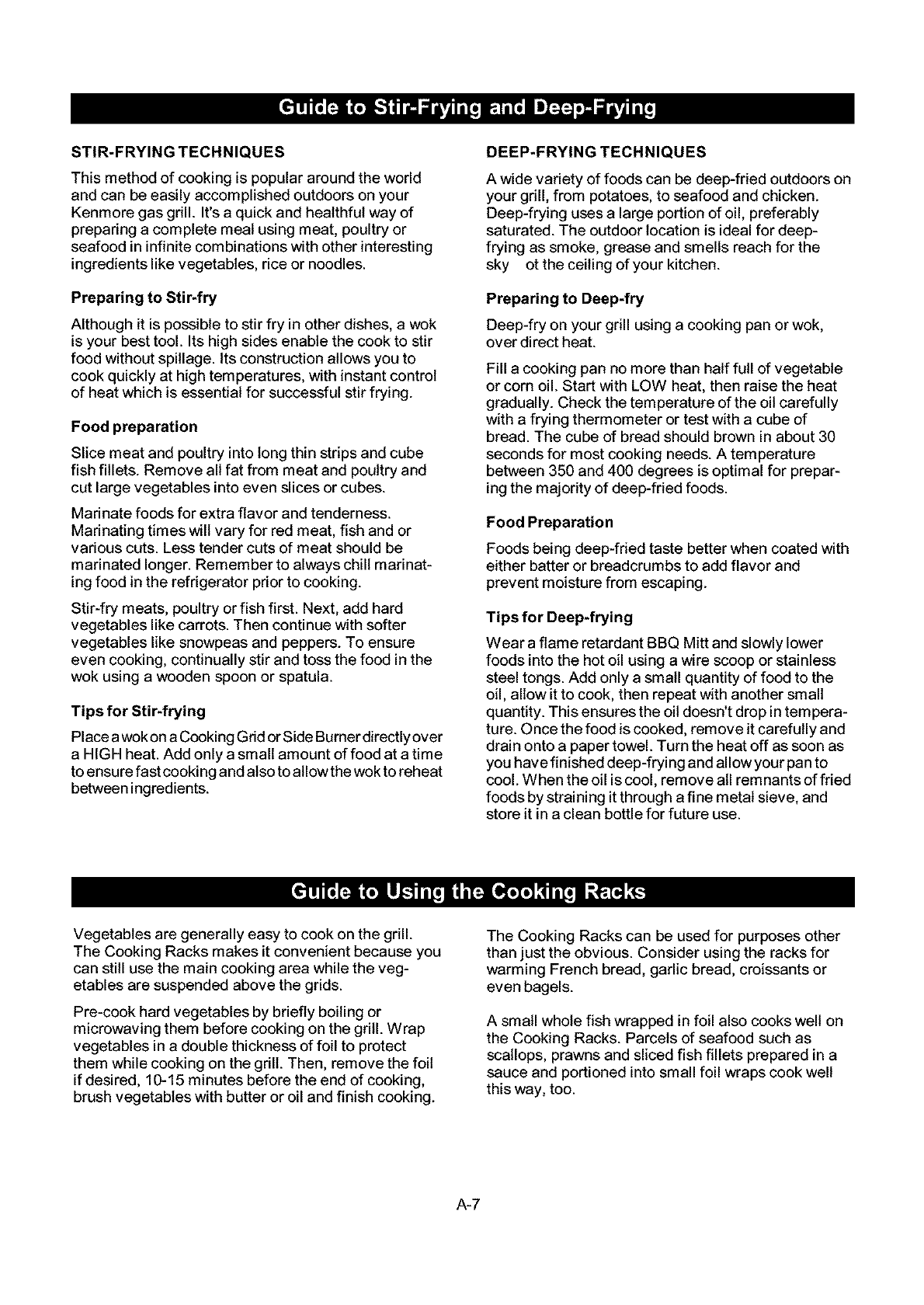Special offers from our partners!

Find Replacement BBQ Parts for 20,308 Models. Repair your BBQ today.

STIR-FRYING TECHNIQUES
This method of cooking is popular around the world
and can be easily accomplished outdoors on your
Kenmore gas grill. It's a quick and healthful way of
preparing a complete meal using meat, poultry or
seafood in infinite combinations with other interesting
ingredients like vegetables, rice or noodles.
Preparing to Stir-fry
Although it is possible to stir fry in other dishes, a wok
is your best tool. Its high sides enable the cook to stir
food without spillage. Its construction allows you to
cook quickly at high temperatures, with instant control
of heat which is essential for successful stir frying.
Food preparation
Slice meat and poultry into long thin strips and cube
fish fillets. Remove all fat from meat and poultry and
cut large vegetables into even slices or cubes.
Marinate foods for extra flavor and tenderness.
Marinating times will vary for red meat, fish and or
various cuts. Less tender cuts of meat should be
marinated longer. Remember to always chill marinat-
ing food in the refrigerator prior to cooking.
Stir-fry meats, poultry or fish first. Next, add hard
vegetables like carrots. Then continue with softer
vegetables like snowpeas and peppers. To ensure
even cooking, continually stir and toss the food in the
wok using a wooden spoon or spatula.
Tips for Stir-frying
Place a wokon a Cooking Grid or Side Burner directly over
a HIGH heat. Add only a small amount of food at a time
to ensure fast cooking and also to allow the wok to reheat
between ingredients.
DEEP-FRYING TECHNIQUES
A wide variety of foods can be deep-fried outdoors on
your grill, from potatoes, to seafood and chicken.
Deep-frying uses a large portion of oil, preferably
saturated. The outdoor location is ideal for deep-
frying as smoke, grease and smells reach for the
sky ot the ceiling of your kitchen.
Preparing to Deep-fry
Deep-fry on your grill using a cooking pan or wok,
over direct heat.
Fill a cooking pan no more than half full of vegetable
or corn oil. Start with LOW heat, then raise the heat
gradually. Check the temperature of the oil carefully
with a frying thermometer or test with a cube of
bread. The cube of bread should brown in about 30
seconds for most cooking needs. A temperature
between 350 and 400 degrees is optimal for prepar-
ing the majority of deep-fried foods.
Food Preparation
Foods being deep-flied taste better when coated with
either batter or breadcrumbs to add flavor and
prevent moisture from escaping.
Tips for Deep-frying
Wear a flame retardant BBQ Mitt and slowly lower
foods into the hot oil using a wire scoop or stainless
steel tongs. Add only a small quantity of food to the
oil, allow it to cook, then repeat with another small
quantity. This ensures the oil doesn't drop in tempera-
ture. Once the food is cooked, remove it carefully and
drain onto a paper towel. Turn the heat off as soon as
you have finished deep-frying and allow your pan to
cool. W hen the oil is cool, remove all remnants of flied
foods by straining itthrough a fine metal sieve, and
store it in a clean bottle for future use.
Vegetables are generally easy to cook on the grill.
The Cooking Racks makes it convenient because you
can still use the main cooking area while the veg-
etables are suspended above the grids.
Pre-cook hard vegetables by briefly boiling or
microwaving them before cooking on the grill. Wrap
vegetables in a double thickness of foil to protect
them while cooking on the grill. Then, remove the foil
if desired, 10-15 minutes before the end of cooking,
brush vegetables with butter or oil and finish cooking.
The Cooking Racks can be used for purposes other
than just the obvious. Consider using the racks for
warming French bread, garlic bread, croissants or
even bagels.
A small whole fish wrapped in foil also cooks well on
the Cooking Racks. Parcels of seafood such as
scallops, prawns and sliced fish fillets prepared in a
sauce and portioned into small foil wraps cook well
this way, too.
A-7


















